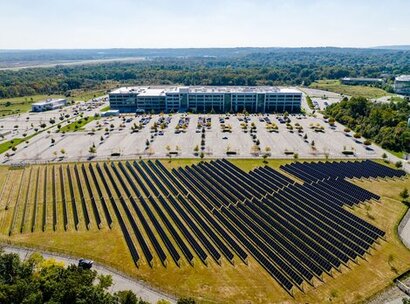
The solar array in California will provide 70 percent of the site’s electrical demand. Both projects align with Bayer’s sustainability commitments to reach carbon neutrality by 2030 and to have net-zero waste across its entire value chain by 2050. A key strategy to achieving Bayer’s reduction targets, which have been approved by the Science Based Targets initiative, is to purchase 100 percent sustainable renewable electricity by 2030.
Bayer has put a large focus on utilising energy efficiency and clean energy resources to achieve its robust, science-based sustainability targets. In accordance with the United Nations Sustainable Development Goals and the Paris Agreement to limit global warming to 1.5 degrees Celsius, Bayer aims to continuously reduce GHG emissions within the company and along its entire value chain through increasing deployment of renewable energy.
“These solar installations are a strong signal to our employees, customers and communities where we live and operate of our commitment to GHG emission reduction” said Delf Bintakies, Global Head of Sustainability, Safety, Health & Environments (SSHE) at Bayer. “Bayer sets specific criteria for its own procurement of green energy. This includes the proximity of energy production facilities to Bayer sites, the use of new sources of generation and a focus on wind and solar power.”
In Woodland, Bayer worked with Enel North America to complete a 2.7 MW solar and 1 MW/2 MWh energy storage system that will power 70 percent of the site’s electrical energy. Occupying approximately 10 of the 210 acres of company-owned property supporting agricultural research, the system utilises ground-mounted solar panels capable of generating nearly two megawatts of electricity.
Complementing the solar array is a bank of batteries serving as storage for excess power to be used to offset evening peak power demand when solar generation subsides. Eight Electric Vehicle chargers will be installed for employee use later this year. Located in a region historically prone to rolling blackouts and grid disruptions, the solar-plus-storage system will help increase Bayer’s energy and operational resilience, while also reducing its carbon footprint and demand on local energy infrastructure.
“This project is a great example of Bayer’s commitment to achieve a 42 percent reduction in greenhouse gas (GHG) emissions by 2030” added Staci A Rosenberger, Woodland & San Juan Bautista Site Operations Lead at Bayer. “With this investment, we will reduce our impact on the environment and offset electrical usage during peak demand, benefiting not only our company, but surrounding communities as well.”
During the estimated 30-year life of the solar project, flowering cover crops, such as wildflowers, will be planted between the rows of panels for aesthetic, pollinator habitat, and soil remediation purposes.
Bayer’s Woodland site, which was established in 1972, consists of nearly 400 acres of owned and leased land. Approximately 230 plant breeders, scientists, administrators and agronomists from more than 20 different countries work at the Woodland site. At peak periods, Bayer may also employ an additional 100+ temporary workers at the site.
Woodland employees serve the community through active volunteer participation with local non-profit organisations as well as welcome students from surrounding schools to experience hands-on learning in the newly opened Baylab, a STEM education center. Students have opportunities to learn about sustainable agricultural practices such as integrated pest management, improved breeding methodologies, and more. In addition, the site will soon house a Bayer LifeHub, a space to support innovative sustainable agriculture and food production systems and contribute to increasing societal understanding and acceptance of new technologies transforming ag and food production systems.
In Whippany, Bayer partnered with DSD Renewables (DSD) to complete a 1.7 MW ground mount solar installation that will offset approximately 25 percent of the Whippany site’s total annual usage. The installation is comprised of 3,600 modules that will follow or ‘track’ the sun’s path from East to West each day. The design, which was completed in December 2023, helps maximise the energy the system can produce.
Throughout the development of the solar project, which began in October 2022, there were a number of design nuances, which the DSD team had to account for. Marrying form and functionality, the team strategically preserved the surrounding landscaping while optimising solar production. This involved shifting a fence line and limiting tree removal, adding river rock to match the site’s aesthetic, and coordinating closely with the team at Bayer to ensure its on-site bee colony at Whippany, which is used for tree pollination, was not disrupted.
“This installation is the perfect example of our approach to solar development, engineering, construction, and financing” said Dan O’Brien, Vice President of Commercial Origination at DSD. “We’re proud to have met the unique needs and nuances of the site while delivering a valuable and aesthetically fitting project for Bayer’s main US offices.”
Bayer has been utilising solar energy for over 20 years, starting with a solar installation at its North America Consumer Health R&D labs in Morristown, NJ. The recent launch of the Whippany and Woodland solar projects represents the latest renewable energy efforts by the company in the US, which has previously announced significant projects in this space, including its Idaho Renewable Energy Agreement with Cat Creek Energy (CCE) last year.
For additional information:

